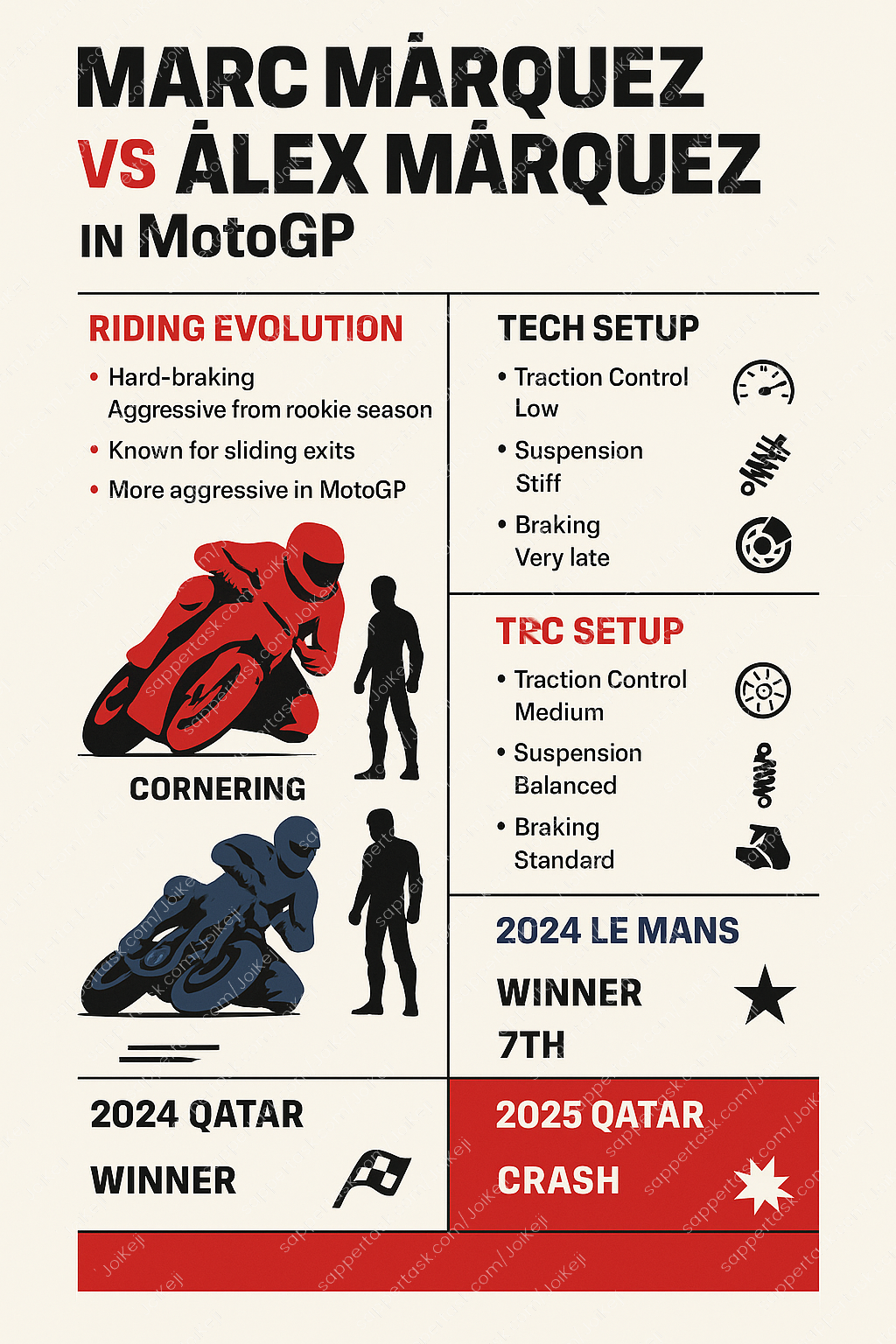latest highlights and results from the 2025 MotoGP, Moto2, and Moto3 seasons as of mid-May:
MotoGP 2025 Highlights
French Grand Prix (Le Mans)
Winner: Johann Zarco (Castrol Honda LCR) made history by becoming the first French rider in 71 years to win the French Grand Prix, ending Pierre Monneret’s long-standing 1954 record.
Runner-up: Marc Márquez (Ducati Lenovo Team) finished second, reinforcing his lead in the championship standings.
Third Place: Fermín Aldeguer (Gresini Racing) achieved his first MotoGP podium in third place.
Notable Incidents: The race was marked by multiple bike swaps and a red flag due to unpredictable weather. Polesitter Fabio Quartararo crashed early, dashing local hopes, while Ducati’s 22-race win streak in MotoGP was snapped by Honda.
Season Overview (Rounds 1–6)
Marc Márquez dominated the early season with victories in Thailand, Argentina, and Qatar.
Álex Márquez secured a win at the Spanish Grand Prix.
Francesco Bagnaia triumphed at the Grand Prix of the Americas.
Johann Zarco claimed victory at the French Grand Prix.
Moto2 2025 Highlights
French Grand Prix (Le Mans)
Winner: Manuel González (Liqui Moly Dynavolt Intact GP) secured his third win of the season, maintaining his lead in the championship.
Runner-up: Barry Baltus (RW Racing GP) finished second after a strong performance.
Third Place: Arón Canet (Fantic Racing Lino Sonego) completed the podium in third place.
Season Overview (Rounds 1–6)
Manuel González has been a standout performer with victories in Thailand, Spain, and France.
Jake Dixon achieved back-to-back wins in Argentina and the Americas.
Arón Canet won the Qatar Grand Prix.
Moto3 2025 Highlights
French Grand Prix (Le Mans)
Winner: José Antonio Rueda (Red Bull KTM Ajo) continued his impressive form with another victory.
Pole Position: Máximo Quiles secured pole but finished seventh.
Fourth Place: Álvaro Carpe delivered a strong performance to finish fourth.
Season Overview (Rounds 1–6)
José Antonio Rueda has been dominant with wins in Thailand, the Americas, Spain, and France.
Ángel Piqueras secured victories in Argentina and Qatar.
Constructors' Standings: KTM leads with 150 points, followed by Honda with 87 points.
MotoGP 2025 Highlights
French Grand Prix (Le Mans)
Winner: Johann Zarco (Castrol Honda LCR) made history by becoming the first French rider in 71 years to win the French Grand Prix, ending Pierre Monneret’s long-standing 1954 record.
Runner-up: Marc Márquez (Ducati Lenovo Team) finished second, reinforcing his lead in the championship standings.
Third Place: Fermín Aldeguer (Gresini Racing) achieved his first MotoGP podium in third place.
Notable Incidents: The race was marked by multiple bike swaps and a red flag due to unpredictable weather. Polesitter Fabio Quartararo crashed early, dashing local hopes, while Ducati’s 22-race win streak in MotoGP was snapped by Honda.
Season Overview (Rounds 1–6)
Marc Márquez dominated the early season with victories in Thailand, Argentina, and Qatar.
Álex Márquez secured a win at the Spanish Grand Prix.
Francesco Bagnaia triumphed at the Grand Prix of the Americas.
Johann Zarco claimed victory at the French Grand Prix.
Moto2 2025 Highlights
French Grand Prix (Le Mans)
Winner: Manuel González (Liqui Moly Dynavolt Intact GP) secured his third win of the season, maintaining his lead in the championship.
Runner-up: Barry Baltus (RW Racing GP) finished second after a strong performance.
Third Place: Arón Canet (Fantic Racing Lino Sonego) completed the podium in third place.
Season Overview (Rounds 1–6)
Manuel González has been a standout performer with victories in Thailand, Spain, and France.
Jake Dixon achieved back-to-back wins in Argentina and the Americas.
Arón Canet won the Qatar Grand Prix.
Moto3 2025 Highlights
French Grand Prix (Le Mans)
Winner: José Antonio Rueda (Red Bull KTM Ajo) continued his impressive form with another victory.
Pole Position: Máximo Quiles secured pole but finished seventh.
Fourth Place: Álvaro Carpe delivered a strong performance to finish fourth.
Season Overview (Rounds 1–6)
José Antonio Rueda has been dominant with wins in Thailand, the Americas, Spain, and France.
Ángel Piqueras secured victories in Argentina and Qatar.
Constructors' Standings: KTM leads with 150 points, followed by Honda with 87 points.
latest highlights and results from the 2025 MotoGP, Moto2, and Moto3 seasons as of mid-May:
MotoGP 2025 Highlights
🇫🇷 French Grand Prix (Le Mans)
Winner: Johann Zarco (Castrol Honda LCR) made history by becoming the first French rider in 71 years to win the French Grand Prix, ending Pierre Monneret’s long-standing 1954 record.
Runner-up: Marc Márquez (Ducati Lenovo Team) finished second, reinforcing his lead in the championship standings.
Third Place: Fermín Aldeguer (Gresini Racing) achieved his first MotoGP podium in third place.
Notable Incidents: The race was marked by multiple bike swaps and a red flag due to unpredictable weather. Polesitter Fabio Quartararo crashed early, dashing local hopes, while Ducati’s 22-race win streak in MotoGP was snapped by Honda.
Season Overview (Rounds 1–6)
Marc Márquez dominated the early season with victories in Thailand, Argentina, and Qatar.
Álex Márquez secured a win at the Spanish Grand Prix.
Francesco Bagnaia triumphed at the Grand Prix of the Americas.
Johann Zarco claimed victory at the French Grand Prix.
Moto2 2025 Highlights
French Grand Prix (Le Mans)
Winner: Manuel González (Liqui Moly Dynavolt Intact GP) secured his third win of the season, maintaining his lead in the championship.
Runner-up: Barry Baltus (RW Racing GP) finished second after a strong performance.
Third Place: Arón Canet (Fantic Racing Lino Sonego) completed the podium in third place.
Season Overview (Rounds 1–6)
Manuel González has been a standout performer with victories in Thailand, Spain, and France.
Jake Dixon achieved back-to-back wins in Argentina and the Americas.
Arón Canet won the Qatar Grand Prix.
Moto3 2025 Highlights
French Grand Prix (Le Mans)
Winner: José Antonio Rueda (Red Bull KTM Ajo) continued his impressive form with another victory.
Pole Position: Máximo Quiles secured pole but finished seventh.
Fourth Place: Álvaro Carpe delivered a strong performance to finish fourth.
Season Overview (Rounds 1–6)
José Antonio Rueda has been dominant with wins in Thailand, the Americas, Spain, and France.
Ángel Piqueras secured victories in Argentina and Qatar.
Constructors' Standings: KTM leads with 150 points, followed by Honda with 87 points.
0 Commenti
0 condivisioni
1K Views
0 Anteprima









